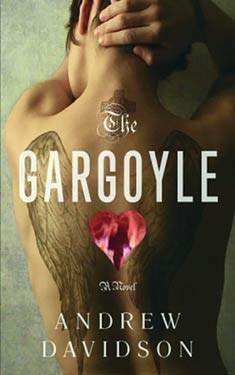Andrew Davidson
Completed 7/15/2017, reviewed 7/16/2017
5 stars
I found this book while searching the “theology” category on
Worlds Without End, for my Theology in Genre Fiction Reading Challenge. I was excited because the library had it,
although I was a little suspect: I found
the book in the literature section instead of Fantasy/SF. What I got was a highly readable, exciting
book with an unlikely romance and only a little theological fantasy
element. Nonetheless, I was completely
satisfied.
 The premise is that the narrator, an actor/director in the
porn industry is in a horrific, fiery car crash, leaving him with burns over
much of his body. While undergoing
extensive repair therapy in the hospital, he meets Marianne, an escapee from
the mental ward who insists they were lovers in a past life. She’s a sculptress, making grotesques, that
is, gargoyles that do not spout water. Once
she leaves the ward, she visits him repeatedly, bringing him stories of their
past life as well as other stories of love and devotion. When it’s time for him to leave the hospital,
he moves in with her. He finds meaning
and love amidst the chaos of her artistic, manic, and possibly schizophrenic
life.
The premise is that the narrator, an actor/director in the
porn industry is in a horrific, fiery car crash, leaving him with burns over
much of his body. While undergoing
extensive repair therapy in the hospital, he meets Marianne, an escapee from
the mental ward who insists they were lovers in a past life. She’s a sculptress, making grotesques, that
is, gargoyles that do not spout water. Once
she leaves the ward, she visits him repeatedly, bringing him stories of their
past life as well as other stories of love and devotion. When it’s time for him to leave the hospital,
he moves in with her. He finds meaning
and love amidst the chaos of her artistic, manic, and possibly schizophrenic
life.
The past life is the part of the book that helps categorize it
as theological. Marianne was a German nun
in the early 1300s. She worked in the
scriptorium, copying and translating books.
She has a natural gift with languages and works on a translation of the
Bible in German and secretly works on a translation of Dante’s Inferno into
German as well. Her work and life is
interrupted when a mercenary soldier is brought to the abbey with burns from a
fiery arrow. She is assigned to care for
him. This is the first time Marianne and
the narrator meet in the past. What
makes this genre fiction is its ambiguous nature. Is the past life real or fiction?
Another aspect of the story that is theological genre
fiction is the narrator’s own descent into hell while he detoxes from
morphine. Like the past life, it is
unclear whether the trip through his own version on Dante’s Inferno is real or
not. Some things happen that are too
uncanny to be simply hallucinations.
The book is really well researched. Besides the details of the fourteenth
century, there is an amazing amount of detail in the plight of the narrator as
a burn victim. The author covers actual
burning experience, the extremely long healing process and the mental and
emotional effects on the victim as well.
Some of the writing is so vivid, I felt like I was experiencing it as it
happened. It is intense and downright
frightening at times.
For a book that straddles the line of genre fiction, I have
to say I thoroughly enjoyed it. I
questioned whether or not it was fantasy right up to the end. But the plot and execution of the book was so
well done that I didn’t mind. If
anything, it was nice to get away from genre fiction for a little bit. The only thing I have to say against the book
is that the details of the burn victim’s experience may be too intense for some
people. I give the book five out of five
stars. The premise is great, the detail
is great, the writing is great. There
are a few plot holes which don’t get wrapped up nicely, but I had such an ecstatic
reaction to the book I couldn’t knock points off for this. I highly recommend this book as long as you
think you can handle the intense burn victim details.
No comments:
Post a Comment